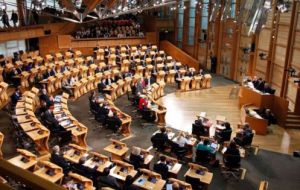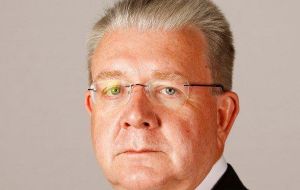MercoPress. South Atlantic News Agency
Scottish Parliament opposes UK government starting the Brexit process
 Ms Sturgeon predicted the vote would be one of the most significant in the Scottish Parliament since devolution.
Ms Sturgeon predicted the vote would be one of the most significant in the Scottish Parliament since devolution.  SNP tried to block UK government's Brexit bill last week. Only one of Scotland's 59 MPs, supported the bill, but it ultimately passed its first hurdle by 498 votes to 114.
SNP tried to block UK government's Brexit bill last week. Only one of Scotland's 59 MPs, supported the bill, but it ultimately passed its first hurdle by 498 votes to 114.  Mr. Russell said the vote “is a key test of whether Scotland's voice is being listened to, and whether our wishes can be accommodated within the UK process.”
Mr. Russell said the vote “is a key test of whether Scotland's voice is being listened to, and whether our wishes can be accommodated within the UK process.” The Scottish Parliament has voted by 90 to 34 to oppose the UK government starting the Brexit process. The Supreme Court ruled last month that there was no legal need for Holyrood to give its consent to the triggering of Article 50, but First Minister Nicola Sturgeon said she would let MSPs have a say, despite it being largely symbolic.
Ms Sturgeon predicted the vote would be one of the most significant in the Scottish Parliament since devolution. The SNP tried to block the UK government's Brexit bill last week. Only one of Scotland's 59 MPs - Scottish Secretary David Mundell - supported the bill, but it ultimately passed its first parliamentary hurdle by 498 votes to 114.
The European Union (Notification of Withdrawal) Bill returned to the Commons on Monday, when MPs began detailed scrutiny of the legislation. MSPs voted to back a Scottish government motion in the Scottish Parliament stating that the bill should not proceed.
The SNP, Greens, Liberal Democrats and most Labour MSPs supported the motion, with three Labour MSPs - Neil Findlay, Elaine Smith and Richard Leonard - defying the party whip and opposing it alongside the Conservatives.
The motion, lodged by Brexit minister Michael Russell, said the UK government had failed to properly consult the devolved administrations on an agreed UK position on Brexit. It also said the government had refused to give a guarantee on the position of EU nationals in the UK, and had failed to answer a range of questions regarding the full implications of withdrawal from the single market.
A Green amendment, stating that the decision to proceed with the Brexit bill does not respect the majority vote to remain part of the EU that was returned in every council area in Scotland, was backed by 72 votes to 33 with 18 abstentions.
Mr. Russell opened what was to become a heated debate by saying Scotland had voted “clearly and decisively” to remain in the EU in last year's referendum He said the Holyrood vote would allow MSPs to “say to the UK, to Europe and to the world that we oppose the catastrophic hard Brexit now being pursued by the Tories at Westminster.”
Mr. Russell added: “This vote is more than symbolic. It is a key test of whether Scotland's voice is being listened to, and whether our wishes can be accommodated within the UK process.”
He insisted that the Scottish government had worked “long and hard” to deliver compromise proposals, which he said would have allowed Scotland to stay in the single market even in the rest of the UK leaves.
But he said: “So far, the UK government has not offered a single compromise of its own. In fact, it has offered nothing. Neither formal reaction to our proposals, nor formal rejection of them.”
Mr Russell went on to describe the Holyrood debate as being “about democracy itself”, adding: “It's a debate about the sort of country the UK is becoming and the sort of country we in Scotland wish to be. And the contrast between those countries is stark.”




Top Comments
Disclaimer & comment rules-

-

-

Read all commentsThe SNP are about to bring in a tax rise (technically a fiscal drag by not raising the 40% threshold but, yes a tax rise) that will raise maybe £150M if they are lucky. However the Barnett formula transfers a net of £9Bn pa to Scotland. So after Indepdence the SNP will need a tax rise / spending cut 50-60'times greater than this to balance the books. That is the equivalent of both privatising NHS Scotland AND raising Income Tax by ~3p. Of course there is a hardcore of Nationalists who would vote for Indepenence at any cost but Scotland has a larger deficit than Greece yet suffers no consequece of this by being in the UK - independence can only be achieved with devastating cuts to services and massive tax rises that will encourage more and more people to leave. It is sad that it is young people who are most in favour of Indepdence when it is their futures that will be worst affected. Free University is a perk of the Barnett formula and not a hard-earned benefit that could possibly survive independence.
Feb 09th, 2017 - 06:42 am +5As for leaving the EU, had Scotland voted Yes last time they would already be out of the EU anyway and trying desperately to get back in despite Spain and Belgium insisting on punishing terms. Interesting that the SNP are already looking at an EEA model instead (which probably IS their best bet) which is only made possible by Brexit.
What worries me most are the already evident cultural and journalistic changes in Scotland that are the inevitable outcomes of life in a one party Nationalist state. It is truly sad to see.
A friend of mine living in London tells me that Nicola Sturgeon is commonly known in the UK as the “Duke of York”. When I asked why he quoted the old nursery rhyme
Feb 08th, 2017 - 01:52 pm +3“The Grand Old Duke of York,
He had ten thousand men,
He marched them up to the top of the hill,
Then he marched them down again.
When they were up, they were up
and when they were down they were down
but when they were only half way up
they were neither up nor down”.
Sums up the SNP quite neatly I thought.
What purpose did that serve ?. She is saying that “Scotland” voted to stay in the EU.
Feb 08th, 2017 - 02:55 pm +3If you count the NO voters and the NON voters then approx 62% of the voting population did NOT vote to stay in the EU. How easy it is to manipulate figures to bolster your own case.
Commenting for this story is now closed.
If you have a Facebook account, become a fan and comment on our Facebook Page!